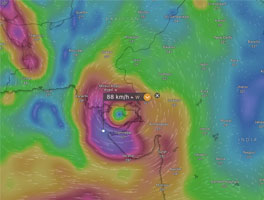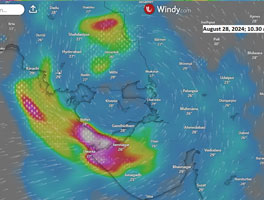 |
Dear readers,
Welcome to the Climate Weekly newsletter by CSE’s Climate Change programme, and Down to Earth (DTE).
A recent study published in the journal Science found that only 63 out of 1,500 climate policies—about 4%—have effectively reduced emissions globally. These successful policies cut emissions by between 0.6 billion and 1.8 billion tonnes of CO2. The study highlighted that India had no successful policies meeting the scale needed for significant reductions. Policies examined included energy-related building codes, subsidies for climate-friendly products, and carbon taxes across buildings, electricity, industry, and transport. Researchers identified 1,500 policies from 41 countries between 1998 and 2022, representing 81% of global emissions in 2019. They found that the best results came from combining measures such as subsidies and regulations with price-based instruments like carbon taxes. For example, bans on coal power or combustion engine cars were more effective when combined with tax incentives. In developing countries, pricing alone was less effective, indicating a need for initial regulatory and subsidy measures. Annika Stechemesser, lead author from the Potsdam Institute for Climate Impact Research, noted that while isolating individual policy measures is challenging, the 63 successful cases provide systematic insights into effective policy combinations, which vary by sector and country development level.
In extreme weather highlights, a deep depression off the coast of Gujarat is set to intensify into a tropical cyclone named ‘Asna’. This will be the first cyclone to form in the month of August in the North Indian Ocean (NIO) region since 1981 and the first in the Arabian Sea since 1976, according to cyclone data from the IMD, analyzed by Down To Earth (DTE).
Finally, CSE’s Climate Change Programme and ODI Climate are set to co-host an online closed door consultation titled ‘What is the Role of Article 2.1c in Advancing Climate Action?’. This half-day virtual-only event aims to bring together a range of relevant stakeholders - climate finance negotiators, representatives of Ministries of Finance and Central Banks, regulators, private finance experts, academia and civil society organisations - to deliberate on what it means for financial flows to be consistent with low-emission, climate-resilient development pathways in accordance with Article 2.1c of the Paris Agreement.
|
|
 |
| |
 |
|
| |
 |
 |
| |
By - Trishant Dev
Climate Change, CSE
|
| |
|
 |
|
|
| |
 |
|
| |
| EXTREME WEATHER TRACKER |
| |
Cyclone Asna formation due to unusual monsoon wind system: Expert, 29 August 2024
|
 |
 |
|
|
| |
 |
|
| |
 |
 |
A rare atmospheric phenomena is behind extreme rainfall, floods in Gujarat — and it’s fuelled by soil moisture, 28 August 2024
|
|
|
| |
|
|
| |
|
|
| |
 |
|
| |
|
|
| |
|
|
| |
 |
|
| |
|
|
| |
|
|
| |
|
|
| |
 |
|
| |
CLIMATE NEWS | SCIENCE| IMPACTS| POLITICS |
|
| |
 |
|
| |
|
|
| |
 |
|
| |
|
|
| |
 |
|
| |
|
|
| |
 |
|
| |
|
|
| |
 |
|
| |
|
|
| |
 |
|
| |
|
|
| |
 |
|
| |
|
|
| |
 |
|
| |
|
|
| |
 |
|
| |
|
|
| |
 |
|
| |
|
|
| |
 |
|
| |
|
|
| |
 |
|
| |
|
|
| |
 |
|
| |
|
|
| |
 |
|
| |
|
|
| |
 |
|
| |
|
|
| |
 |
|
| |
| Book Release |
|
Online Training Course |
| |
|
|
|
|
|
|
|
|
| |
|
|
| |
|
|
| |
|
|